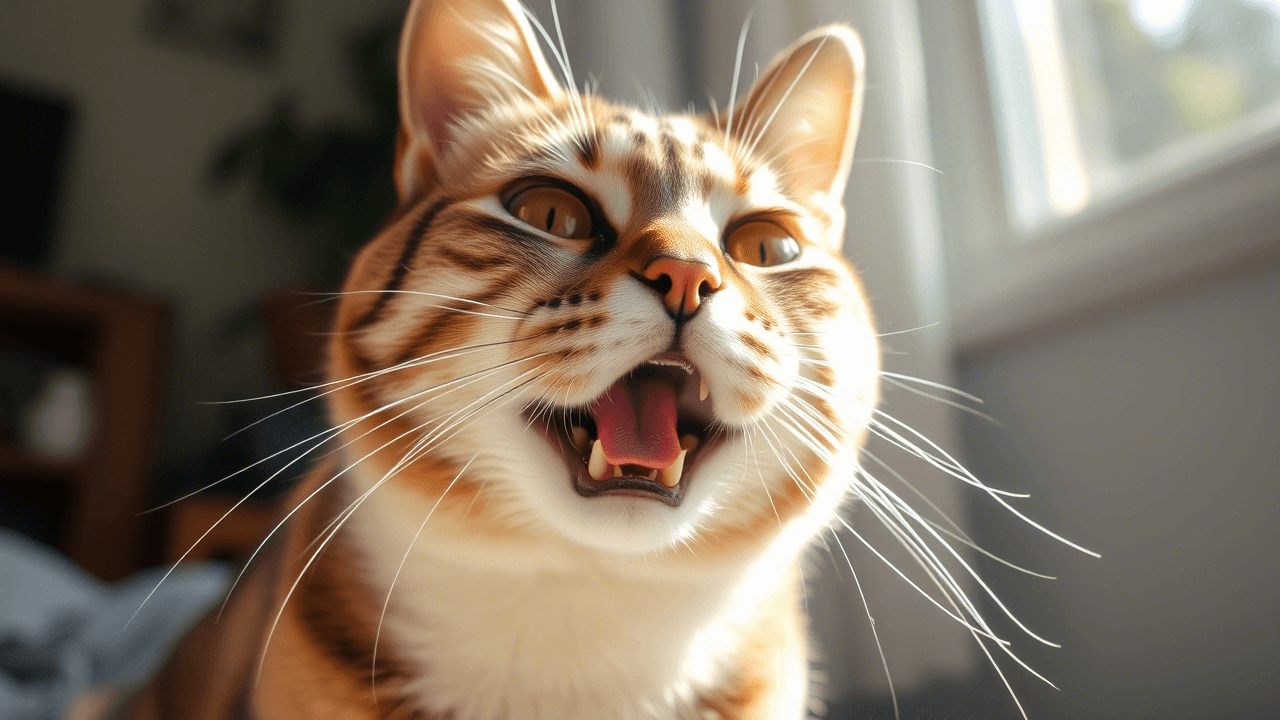
Table of Contents
Is your feline friend’s breath making you recoil? Discover the surprising causes behind your cat’s bad breath and learn proven solutions to freshen their mouth and improve their overall health.
That special moment when your cat cuddles up close for some affection can quickly turn unpleasant when you’re hit with a wave of foul-smelling breath. If you’ve ever wondered, “Why does my cat’s breath smell so bad?” you’re not alone. This common concern affects countless cat owners worldwide, and while the occasional fishy whiff might be normal after mealtime, persistently bad breath in cats often signals underlying health issues that require attention.
Bad cat breath—medically known as halitosis—isn’t just an unpleasant inconvenience; it can be your cat’s way of communicating that something isn’t right in their mouth or elsewhere in their body. From dental disease to digestive issues and even serious systemic conditions, your cat’s breath odor provides important clues about their overall wellness that shouldn’t be ignored.
In this comprehensive guide, we’ll explore everything cat owners need to know about feline halitosis—the common causes, effective solutions, prevention strategies, and when that unpleasant smell warrants an immediate trip to the veterinarian. Whether you’ve noticed your cat’s breath smelling like fish, garbage, ammonia, or something equally concerning, you’ll find answers and actionable advice to help restore your cat’s fresh breath and, more importantly, safeguard their health.
What Causes Bad Breath in Cats?
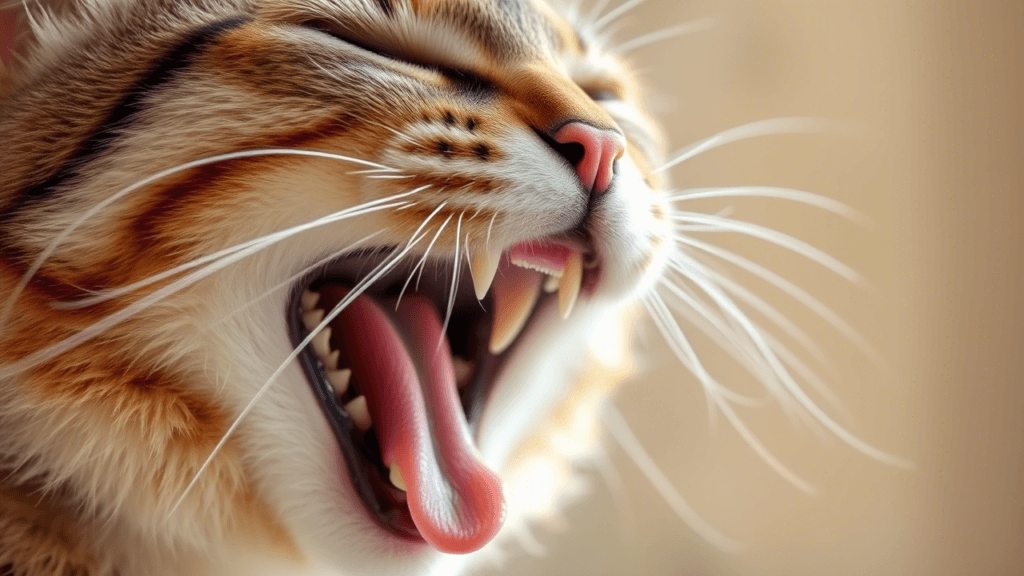
Dental Problems: The Primary Culprit
When investigating why your cat’s breath smells so bad, dental issues top the list of potential causes. According to the American Veterinary Dental College, by the age of three, approximately 70% of cats show signs of dental disease—a staggering statistic that highlights just how common these problems are.
Periodontal Disease
Periodontal disease begins innocuously enough with plaque—a sticky film containing bacteria that forms on your cat’s teeth after eating. When left untreated, this plaque hardens into tartar (or calculus), creating a rough surface where more bacteria can accumulate. As this process continues, the bacteria attack the supporting structures around the teeth, causing gum inflammation (gingivitis), which can progress to periodontitis—infection of the tissues that hold teeth in place.
“The smell associated with periodontal disease is quite distinctive,” explains Dr. Emily Robertson, a veterinary dental specialist. “It’s often described as rotten or putrid, and that’s because of the bacterial waste products being released as oral bacteria multiply in the mouth.”
The telltale signs of periodontal disease include:
- Yellow or brown tartar buildup on teeth
- Red, swollen, or bleeding gums
- Difficulty eating or dropping food
- Pawing at the mouth
- Excessive drooling
- And of course, notably bad breath
Tooth Resorption
Another common dental condition affecting cats is tooth resorption, previously known as feline odontoclastic resorptive lesions (FORLs). This painful condition occurs when the cat’s body begins to break down and absorb the structures of the tooth. While the exact cause remains unclear, these lesions affect up to 60% of cats, with incidence increasing with age.
Tooth resorption often begins at the gumline and may look like small red spots or holes in the teeth. As the condition progresses, it can lead to significant pain, infection, and yes—extremely unpleasant breath as bacteria colonize the damaged areas.
Stomatitis
Feline stomatitis is a severe, painful inflammation of a cat’s mouth and gums that can cause some of the worst breath odors cat owners encounter. Unlike common periodontal disease, stomatitis represents an extreme immune response, where the cat’s body essentially overreacts to plaque bacteria.
“Cats with stomatitis suffer immensely,” notes veterinary internal medicine specialist Dr. Marcus Chen. “The entire mouth becomes inflamed, ulcerated, and extremely painful. The resulting smell can be overwhelming because of the extensive tissue damage and bacterial overgrowth throughout the oral cavity.”
Beyond Dental: Systemic Health Issues
While dental problems are the most common cause of bad breath in cats, several systemic health conditions can also manifest as unpleasant mouth odors. These are particularly concerning because they indicate problems beyond the mouth that may affect your cat’s overall health and longevity.
Kidney Disease
Chronic kidney disease (CKD) affects approximately 30-40% of cats over the age of 10, making it one of the most common diseases in senior felines. As the kidneys lose their ability to filter waste products from the blood effectively, toxins build up in the bloodstream—a condition known as uremia.
One telltale sign of advanced kidney disease is breath that smells like ammonia or urine. This distinctive odor occurs because the kidneys can no longer properly eliminate urea, which breaks down into ammonia compounds that can be detected in the breath.
Other signs of kidney disease that might accompany bad breath include:
- Increased thirst and urination
- Weight loss and decreased appetite
- Vomiting and lethargy
- Poor coat condition
Diabetes Mellitus
If your cat’s breath has a sweet or fruity smell—sometimes described as similar to nail polish remover—diabetes could be the culprit. This distinctive odor results from ketones, compounds produced when the body burns fat instead of glucose for energy.
“Diabetic cats often develop a condition called ketoacidosis when their disease is uncontrolled,” explains veterinary endocrinologist Dr. Patricia Lee. “The sweet acetone smell comes from ketones being excreted not just in urine but also through the respiratory system.”
Diabetes in cats typically also presents with:
- Increased appetite despite weight loss
- Excessive thirst and urination
- Lethargy and weakness
- Unkempt coat due to decreased grooming
Liver Disease
The liver serves as the body’s primary detoxification organ, filtering harmful substances from the blood. When liver function becomes compromised, toxins can accumulate throughout the body, including in saliva and breath.
Cats with liver disease may have breath described as musty or even slightly sweet but in an unpleasant way. This is particularly noticeable in cats with hepatic lipidosis (fatty liver disease), a dangerous condition that can develop when cats—especially overweight ones—stop eating for even a few days.
Gastrointestinal Issues
Problems anywhere along the digestive tract can contribute to bad breath in cats. Conditions like inflammatory bowel disease, intestinal infections, or gastrointestinal cancers may cause malodor as undigested food ferments or as bacteria proliferate abnormally.
“The connection between gut health and breath odor is stronger than many pet owners realize,” says veterinary gastroenterologist Dr. Sarah Winters. “What’s happening in the stomach and intestines directly impacts the compounds that end up in the bloodstream and eventually make their way to the lungs, where they’re exhaled.”
Dietary Factors
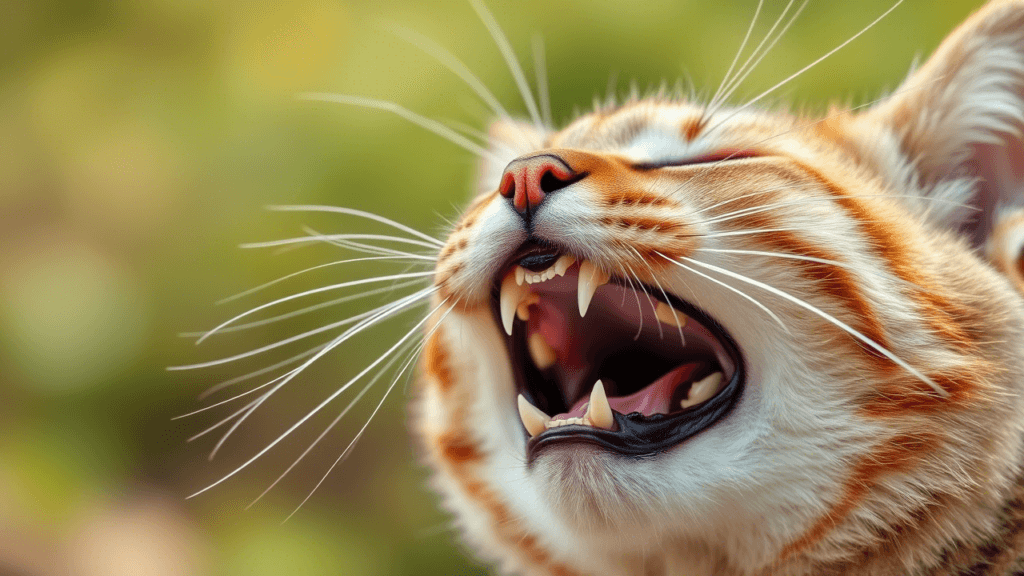
While health issues often explain why a cat’s breath smells so bad, sometimes the answer is much simpler: what they’re eating.
Food Choices
Certain cat foods—particularly fish-based varieties—can leave residual odors in the mouth. While this type of “bad breath” is usually temporary and resolves within a couple of hours after eating, persistently feeding strongly flavored foods can contribute to a chronic odor problem.
Some low-quality cat foods also contain ingredients that are less digestible, potentially leading to gastrointestinal issues that can impact breath odor from within the digestive tract.
Food Allergies
Cats can develop allergies to specific protein sources in their food, which may lead to inflammatory responses throughout the body, including in the mouth and digestive system. These inflammatory conditions can cause bad breath as a secondary symptom.
Foreign Objects or Impacted Food
Occasionally, cats may get food particles or foreign objects lodged between their teeth or in the back of their throat. As these items decompose, they can create a significant odor problem. Items like string, small bones, or plant material can become trapped and cause not only bad breath but also infection if not removed promptly.
How to Diagnose the Cause of Your Cat’s Bad Breath
When to See a Veterinarian
While occasional mild breath odor might not be cause for alarm, persistent bad breath in cats should never be ignored. You should schedule a veterinary examination if:
- Your cat’s breath suddenly becomes noticeably foul
- The bad breath persists for more than a few days
- You notice other symptoms alongside bad breath (such as drooling, difficulty eating, weight loss, increased thirst, or lethargy)
- The breath has a distinctive smell like ammonia, fruit, or extreme decay
- You observe yellow or brown buildup on the teeth or inflamed, red gums
Remember that early intervention can prevent minor issues from developing into serious health concerns. Dr. Thomas Wright, a veterinary dental specialist, emphasizes: “Bad breath isn’t just an inconvenience—it’s a clinical sign. When cat owners recognize this and seek early veterinary care, we often can address problems before they cause significant pain or systemic complications.”
What to Expect During a Veterinary Examination
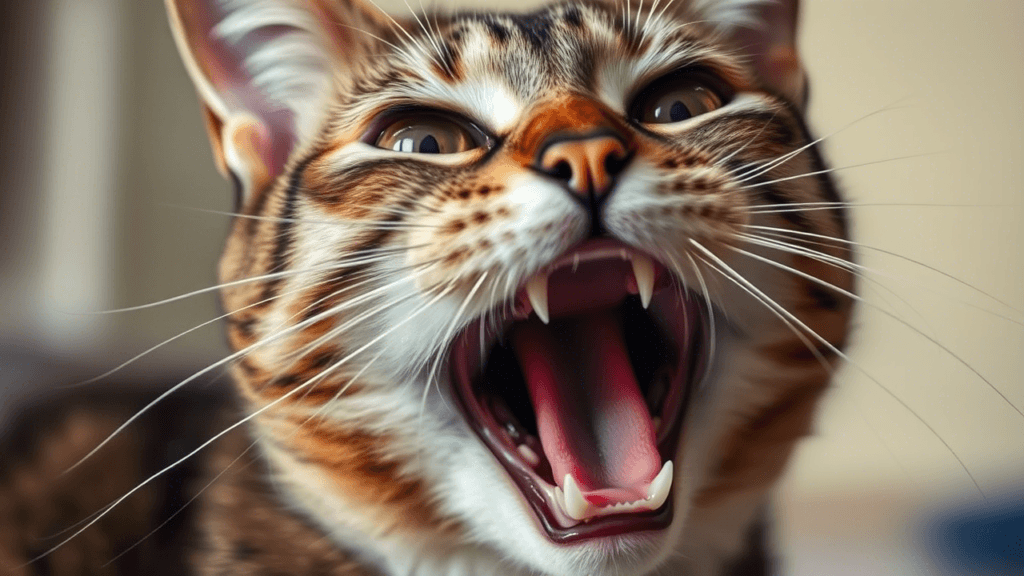
When investigating why your cat’s breath smells so bad, your veterinarian will likely:
- Take a detailed history: Be prepared to discuss when you first noticed the bad breath, any changes in eating habits or behavior, and your cat’s current diet and dental care routine.
- Perform a physical examination: This includes checking your cat’s overall condition, hydration status, and examining the face for any swelling or asymmetry.
- Examine the mouth: Your veterinarian will look for obvious signs of dental disease, inflammation, growths, or foreign objects. However, be aware that cats often need sedation or anesthesia for a thorough oral examination, as many won’t tolerate having their mouth fully opened while awake.
- Recommend diagnostic tests: Depending on their initial findings, your vet might suggest:
- Blood tests to check kidney, liver, and pancreatic function
- Urinalysis to evaluate kidney function and check for diabetes
- Dental X-rays to assess tooth roots and bone loss below the gumline
- Additional imaging if systemic disease is suspected
Dr. Jennifer Morris, a feline specialist, explains: “What appears as simple bad breath to an owner can sometimes be the only outward sign of significant disease. Cats are masters at hiding illness, so when they present with halitosis, we need to take a comprehensive approach to diagnosis.”
Treatment Options for Bad Cat Breath
The appropriate treatment for your cat’s bad breath depends entirely on the underlying cause. Here’s how different conditions are typically addressed:
Dental Disease Treatment
Professional Dental Cleaning
For cats with periodontal disease, a professional dental cleaning performed under anesthesia is often the only effective treatment. This procedure typically includes:
- Scaling to remove tartar above and below the gumline
- Polishing to smooth tooth surfaces and reduce future plaque accumulation
- Full mouth X-rays to identify problems beneath the gumline
- Extractions of severely damaged or diseased teeth if necessary
“A proper veterinary dental cleaning is nothing like the simple tartar scraping some groomers or non-veterinary services offer,” cautions Dr. Michelle Davis, a veterinary dentist. “Without anesthesia, it’s impossible to clean properly below the gumline where the disease actually occurs, or to perform essential procedures like dental radiographs.”
The good news is that once dental disease is properly addressed, the associated bad breath typically resolves quickly, often within days of the procedure.
Extractions for Stomatitis or Severe Disease
For cats with stomatitis or advanced periodontal disease, extraction of affected teeth is often necessary. While this might sound extreme, many cats experience dramatic improvement in their comfort and quality of life following extractions.
Studies show that approximately 80% of cats with stomatitis show significant improvement or complete resolution of symptoms following full-mouth or near-full-mouth extractions. Once the source of inflammation is removed, the painful oral tissues can heal, and the foul odor disappears.
Treatment for Systemic Diseases
If your cat’s bad breath stems from a systemic health issue, treatment will focus on managing the underlying condition:
Kidney Disease Management
For cats with kidney disease, treatment typically involves:
- Special renal diets formulated to reduce kidney workload
- Medications to manage blood pressure and reduce protein loss
- Fluid therapy to maintain hydration
- Phosphate binders and medications to address secondary complications
With appropriate management, the uremic breath associated with kidney disease often improves, though ongoing treatment is necessary to maintain kidney function for as long as possible.
Diabetes Treatment
Diabetic cats require:
- Insulin therapy (typically twice-daily injections)
- Dietary management, often with low-carbohydrate foods
- Regular blood glucose monitoring
- Weight management
Once diabetes is controlled, the sweet ketone breath odor should resolve completely.
Liver Disease Treatment
Treatment for liver disease varies based on the specific condition but may include:
- Supportive care and fluid therapy
- Special diets
- Medications to support liver function
- Vitamin supplements
- In some cases, feeding tubes for cats who won’t eat voluntarily
As liver function improves, the associated breath odor typically diminishes.
Gastrointestinal Disease Management
For digestive tract issues, treatment might involve:
- Dietary changes or prescription diets
- Antibiotics for bacterial overgrowth
- Anti-inflammatory medications
- Probiotics to support healthy gut flora
Home Care for Bad Cat Breath
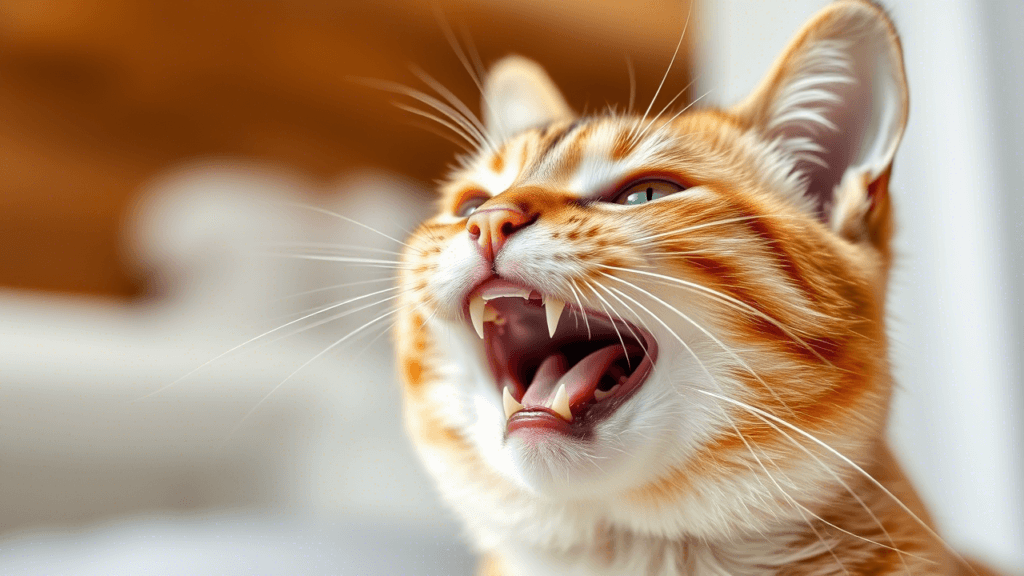
While professional treatment is essential for addressing the underlying causes of bad breath, home care plays a crucial role in both treatment and prevention.
Brushing Your Cat’s Teeth
Daily tooth brushing remains the gold standard for preventing plaque buildup and keeping breath fresh. Here’s how to approach this potentially challenging task:
- Start gradually: Begin by getting your cat comfortable with having their mouth touched.
- Use appropriate tools: Purchase a cat-specific toothbrush or finger brush and cat-formulated toothpaste (never use human toothpaste, which contains harmful ingredients).
- Keep sessions short: Aim for just a few seconds of brushing at first, gradually building up to about 30 seconds per session.
- Be consistent: Even brushing 2-3 times per week is beneficial if daily isn’t achievable.
“The key with tooth brushing is patience and positive reinforcement,” advises veterinary technician specialist Lisa Morgan. “Most cats can learn to tolerate or even enjoy the process if it’s introduced gradually and associated with rewards.”
Dental Diets and Treats
Several commercially available cat foods and treats are designed specifically to reduce plaque and tartar buildup:
- Dental diets: These prescription foods have special kibble structures and coatings that help clean teeth mechanically as cats chew.
- Dental treats: Products like Greenies™ or C.E.T.® treats can help reduce plaque when given regularly.
Look for products bearing the Veterinary Oral Health Council (VOHC) seal of approval, which indicates they’ve been proven effective in controlled studies.
Water Additives and Oral Gels
For cats who won’t tolerate brushing, water additives can provide a passive approach to oral care:
- Dental water additives: These are simply added to your cat’s drinking water and help reduce bacterial growth.
- Oral gels: Applied directly to the gums, these products contain enzymes or other ingredients that help break down plaque.
While not as effective as brushing, these products can be helpful supplements to a dental care routine.
Preventing Bad Breath in Cats
Prevention is always preferable to treatment when it comes to feline halitosis. A proactive approach includes:
Routine Veterinary Care
- Regular checkups: Have your cat examined by a veterinarian at least annually, with twice-yearly visits recommended for seniors.
- Dental assessments: Ask your veterinarian to evaluate your cat’s oral health at each visit.
- Professional cleanings: Schedule dental cleanings as recommended by your veterinarian, typically every 1-2 years depending on your cat’s predisposition to dental disease.
Diet and Nutrition
- Quality diet: Feed your cat high-quality food appropriate for their age and health status.
- Consider texture: Some studies suggest that dry kibble may provide mild mechanical cleaning compared to wet food alone.
- Avoid frequent fish: If your cat’s breath is particularly fishy, consider rotating protein sources.
Environmental Enrichment
- Provide chew toys: Dental toys can help scrape plaque from teeth while satisfying natural chewing instincts.
- Consider raw bones: Under veterinary guidance, some cats benefit from gnawing on appropriate raw bones (never cooked bones, which can splinter).
When Bad Breath Signals an Emergency
While most causes of bad breath can be addressed during a scheduled veterinary visit, certain situations warrant immediate emergency care:
- Extremely foul odor with drooling and lethargy: Could indicate an oral abscess or systemic toxicity
- Sweet, fruity breath with severe lethargy: May signal diabetic ketoacidosis, a life-threatening condition
- Breath that smells like ammonia with vomiting and collapse: Could indicate acute kidney failure
- Any breathing difficulty accompanying bad breath: Always an emergency regardless of cause
“Trust your instincts as a pet owner,” urges emergency veterinarian Dr. Robert Chang. “If your cat’s breath odor is accompanied by significant behavior changes or signs of illness, don’t wait for a regular appointment. Seeking emergency care promptly can sometimes mean the difference between life and death.”
The Emotional Impact of Feline Halitosis
Beyond the health implications, bad breath can affect the bond between cats and their owners. Many cat owners report distancing themselves from pets with halitosis, leading to less interaction, fewer cuddle sessions, and potentially missed opportunities to notice other developing health issues.
“We sometimes see cats whose dental disease has progressed to an advanced stage because owners have unconsciously been avoiding close contact due to the smell,” observes feline behaviorist Dr. Angela Williams. “This creates a cycle where both the cat’s physical and emotional needs aren’t being fully met.”
By addressing bad breath proactively, you’re not just improving your cat’s health—you’re preserving the special bond you share.
Conclusion
The question “Why does my cat’s breath smell so bad?” rarely has a simple answer. From dental disease to serious systemic conditions, bad breath serves as an important warning sign that shouldn’t be ignored. By understanding the potential causes, seeking appropriate veterinary care, and implementing preventive strategies at home, you can help ensure your feline companion enjoys both fresh breath and good overall health.
Remember that cats are masters at hiding pain and discomfort. By the time they show obvious signs of dental disease or other conditions, the problem has often progressed significantly. Regular veterinary care, combined with attentive home observation, provides your best defense against the underlying causes of bad breath.
If you’ve noticed your cat’s breath smelling particularly unpleasant lately, don’t dismiss it as normal “cat breath.” Schedule a veterinary examination to determine the cause, and take this opportunity to discuss establishing a comprehensive dental care routine tailored to your cat’s specific needs. Your cat will thank you with sweeter-smelling cuddles and, more importantly, a longer, healthier, more comfortable life.
Has your cat been struggling with bad breath? Share your experiences or questions in the comments below, and consider scheduling that veterinary checkup today—your feline friend deserves nothing less than the best care possible.
FAQ: Cat Bad Breath Questions Answered
Is bad breath normal for cats?
Mild breath odor can be normal in cats, especially right after eating, but persistently bad breath is not normal and typically indicates an underlying health issue. The stereotype of “cat breath” being naturally unpleasant is actually a misconception—healthy cats should not have notably offensive breath. If you’re regularly noticing a strong odor from your cat’s mouth, it’s important to have them evaluated by a veterinarian to determine the cause. Even mild halitosis can be a sign of early periodontal disease or other developing health concerns that are easier to address when caught early.
How can I tell if my cat’s bad breath is caused by dental problems or something more serious?
While it’s difficult to definitively determine the cause without veterinary examination, certain characteristics can provide clues. Dental-related bad breath typically has a putrid, decaying smell and may be accompanied by visible tartar on the teeth, red or bleeding gums, and changes in eating habits. Breath that smells like ammonia or urine might indicate kidney issues, while sweet or fruity breath could suggest diabetes. Breath with a strong fecal odor might point to digestive problems. However, these are just general guidelines—any persistent bad breath warrants professional evaluation as the underlying causes can only be definitively diagnosed through veterinary examination and appropriate testing.
My cat won’t let me brush their teeth. What are my alternatives?
While daily brushing is ideal, there are several alternatives for cats who won’t tolerate it. Dental diets and treats specially formulated to reduce plaque can help (look for the VOHC seal of approval). Water additives can be simply added to your cat’s drinking water to help reduce bacteria. Dental gels that can be applied to the gums without brushing may also help. Dental toys and certain chew items can provide some mechanical cleaning action. However, it’s important to understand that these alternatives are not as effective as brushing and professional cleaning. Regular veterinary dental checkups and professional cleanings under anesthesia remain essential for cats who won’t tolerate home brushing.
Can certain foods cause or improve my cat’s bad breath?
Yes, diet can definitely impact your cat’s breath. Fish-based foods often leave stronger residual odors than poultry or other proteins. Low-quality foods with artificial additives and fillers may contribute to dental problems and digestive issues that worsen breath odor. On the improvement side, prescription dental diets are specially formulated with kibble texture and size that helps clean teeth mechanically as cats chew. Some premium cat foods include ingredients like parsley or mint that may help freshen breath slightly. However, if your cat has persistent bad breath, dietary changes alone usually won’t resolve the underlying problem, and veterinary care should be sought.
How often should my cat have a professional dental cleaning?
The frequency of professional dental cleanings depends on your individual cat’s predisposition to dental disease and your home care routine. Most veterinarians recommend dental cleanings every 1-2 years for the average cat, but some cats with severe dental disease may need cleaning more frequently, while others with excellent genetics and home care might go longer between professional cleanings. Senior cats generally benefit from more frequent dental assessments and cleanings as dental disease tends to progress more rapidly with age. The best approach is to have your veterinarian examine your cat’s mouth at regular checkups and follow their recommendations for professional cleaning frequency based on your cat’s specific oral health status.
Is bad breath in kittens a concern, or do they just have “kitten breath”?
While kittens can have a slightly different breath odor than adult cats, persistently bad breath in kittens is not normal and should be investigated. “Kitten breath” is typically described as slightly sweet or milk-scented and shouldn’t be offensive. Foul breath in kittens could indicate several issues: retained deciduous (baby) teeth, developing periodontal disease, oral injuries from chewing inappropriate objects, congenital problems, or digestive issues. Kittens are also prone to picking up intestinal parasites, which can sometimes contribute to bad breath through digestive disturbances. If your kitten has noticeably bad breath, a veterinary examination is recommended to ensure proper oral development and overall health.
Can bad breath in cats go away on its own?
Temporary bad breath caused by recently eaten food (especially fish) may resolve on its own within hours. However, bad breath resulting from dental disease, oral infections, or systemic health conditions will not improve without appropriate treatment—in fact, these conditions typically worsen over time without intervention. Dental disease is progressive, meaning it continues to advance if not addressed. Systemic conditions like kidney disease or diabetes require specific medical management. If your cat’s bad breath persists for more than a few days, it’s not likely to resolve spontaneously and veterinary care should be sought to identify and treat the underlying cause.
Sources
- Cornell University College of Veterinary Medicine – Dental Disease in Cats
- American Veterinary Dental College – Pet Dental Care
- Journal of Veterinary Dentistry – Prevalence of Dental Disorders in Cats
- International Cat Care – Dental Disease and Bad Breath
- Journal of Feline Medicine and Surgery – Feline Chronic Kidney Disease







